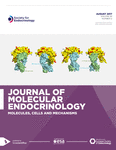Emerging functional roles of nuclear receptors in breast cancer
- Westmead Institute for Medical Research, Sydney Medical School – Westmead, University of Sydney, Sydney, New South Wales, Australia
- Correspondence should be addressed to T B Doan; Email: tram.doan{at}sydney.edu.au
Abstract
Nuclear receptors (NRs) have been targets of intensive drug development for decades due to their roles as key regulators of multiple developmental, physiological and disease processes. In breast cancer, expression of the estrogen and progesterone receptor remains clinically important in predicting prognosis and determining therapeutic strategies. More recently, there is growing evidence supporting the involvement of multiple nuclear receptors other than the estrogen and progesterone receptors, in the regulation of various processes important to the initiation and progression of breast cancer. We review new insights into the mechanisms of action of NRs made possible by recent advances in genomic technologies and focus on the emerging functional roles of NRs in breast cancer biology, including their involvement in circadian regulation, metabolic reprogramming and breast cancer migration and metastasis.
- Received 13 December 2016
- Accepted 12 January 2017
- Made available online as an Accepted Preprint 13 January 2017
- © 2017 Society for Endocrinology











